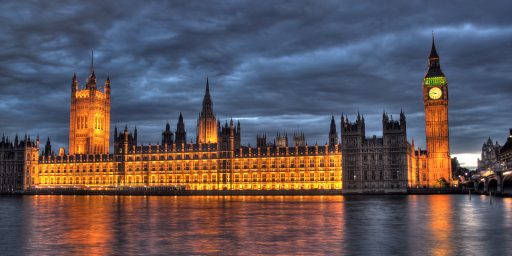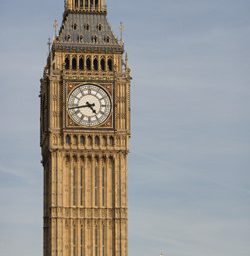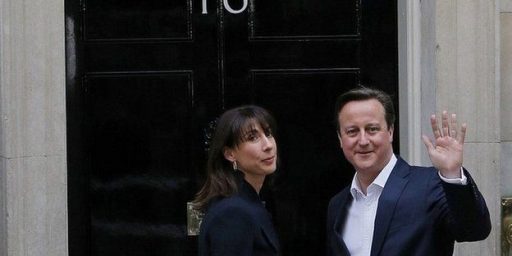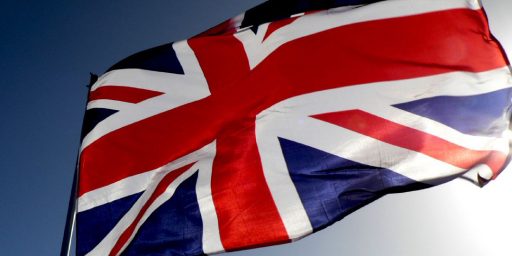Let the Games Begin! (Institutional Reform Edition)
Now on to solving the complex puzzle of the post-referendum UK.
Via the BBC: Scottish referendum: Gordon Brown vows ‘powers will be delivered’
Prime Minister David Cameron has vowed to deliver on the pre-referendum promises made by the three main Westminster parties to boost the powers of Scotland’s devolved parliament.
He has tasked Lord Smith of Kelvin, who led Glasgow’s staging of the Commonwealth Games, with overseeing the process of taking their commitments forward, with new powers over tax, spending and welfare to be agreed by November, and draft legislation published by January.
All of the comparative institutions types will, no doubt, be most fascinated by the process. At a minimum it will bring forth some excellent areas for discussion in the classroom.
Further, what will the post-reform UK look like? Will it be a further devolved version of a unitary state or will it start to look quasi-federal? Much depends on how they deal with England’s place in the mix. As long as Parliament functions as both the national legislature and England’s there is going to be conflict.
I am not sure, for example, how well something like the following would work:
Mr Cameron has also proposed a system where only MPs from England would vote on English issues in Parliament.
As BBC correspondent Chris Mason notes in the above linked piece, the issue at hand I more than just giving Scotland more power:
here is the sticking point: Can the two issues of England and Scotland be unpicked?
Labour is insisting that the two should be unpicked, that devolution for England cannot be rushed and that there has to be conversation in the rest of the UK, just as there’s been a conversation in Scotland.
But the Conservatives say the two have to remain together – that the English cannot be fobbed off.
This will not be easy to resolve.
Indeed. (For example, from another BBC piece: Labour warns of ‘two classes of MP’ if England-only votes go ahead).
See also: Constitutional change: The debate starts here
A vote to reject massive constitutional change in one part of the UK has triggered a debate about just that in every part of it.






How about a Federal Monarchy of the United Kingdom of England, Northern Ireland, Scotland, and Wales, modelled on the Federal Republic of Germany?
You could probably get an England-only parliament, or even just have only English MPs voting on certain English issues. Going any smaller in England – like different parliaments in different parts of England – would probably be unpopular. The English voted against it years ago IIRC.
Is this going to be more of a party self-interest competition? I read somewhere (sorry no attribution) that Scots MPs are mostly Labor while England’s are mostly Conservative or Tory plus there are the UKIPs. It seems each party would want as many votes as possible on any question so making exclusive votes by country may not be welcome.
Gosh, does this mean that England is actually a — can I say it — an ’empire’? And that Scotland, Wales and Ireland are kind of like — what would be the word? — ‘possessions’? And that somehow that is an arrangement that doesn’t work out very well for anybody?
Nah. ‘Cause if that ’empire’ business doesn’t work out for ANYBODY, then maybe the US should sort of re-imagine our role on this little planet.
And THAT can’t be right.
@Mr. Prosser:
That’s pretty much the shape of it. However, you have to take into account the UK has some big regional differences (Think comparing the deep south to the north east)
The UK has 650 MPs which form the national government.
The UK now has two types of area- one is the equivalent to a state (Scotland, Wales, Northern Ireland) where the local government can control certain areas without central government involvement (a la states rights). These represent maybe 150 of the seats.
The remaining 500 seats are England, and function more like DC, with the central government exerting more direct control. However, like DC, this tends to mean that people not directly effected by decisions still get to weigh in on areas in England that have been devolved in other areas of the country (and therefore out of their control- basically they can change healthcare policy in England but not their own district). It also means they pay no price for voting for unpopular legislation, because no-one who can vote against them is affected by it. They therefore tend to toe the party line, because it costs them nothing and makes the party happy and supportive.
When England majority and the overall government are the same party this isn’t a big issue, but when the two differ a major clash is set up, simply because the overall government tends to pull in outside votes to get its’ way when the majority of England doesn’t like the idea in question.
The Tory’s are basically an England based party- they are normally the biggest party there, and often hold a majority of the seats (3 major national parties). They don’t hold many non-english seats.
Labour and the Lib Dems are the other two parties and both get a significant number of seats from Scotland and Wales (NI is a bit odd with lots of small parties). Labour in particular often end of with a quarter to a fifth of their number coming from Scotland and Wales (about 65 of 256 at the moment).
The result of an English parliament fix is therefore the risk that you could one day have a close election with a Labour win, where they don’t actually have much power at all- Scotland dominated by the SNP, Wales by Plaid Cymru, NI by various local parties, and England by the Tories. The only things they could control are the areas reserved for national government, meaning basically some tax areas, national defence, and so on.
Labour really don’t like the idea of that, but they also brought it on themselves- they were the ones who started the entire devolution mess to try and hold onto control in Scotland and Wales (both of which they expected to vote Labour in perpetuity) even when the Tories got back in again. It is now looking increasingly like they shot themselves in the foot.
@CS: Thanks, I think. As Galahd said of the French castle guard in Monty Python, “What a strange person!” Substitute system for person.